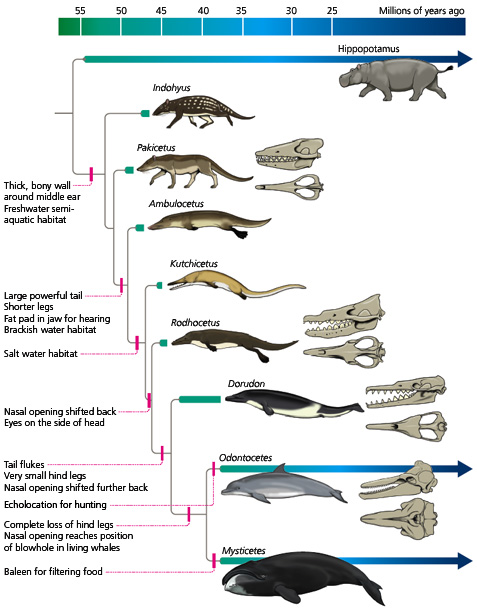Really... whether or not "natural selection did it" is being tested? Now that's rich.... I wonder what your falsification criteria is for that one.
To falsify natural selection and descent with modification, you would have to demonstrate that reproduction of DNA is flawless, or that populations do not adapt to their niches. It's a legitimate falsification criteria; the fact that it's so hard to imagine it ever happening should speak volumes to the simple strength of descent with modification.
I already told you my conclusions. That Evolution theory makes no substantial predictions about the fossil record. If you find a fossil 20,30,40.. +?? million years out of stratigraphic sequence then it can be accommodated with "niches".
Thus your previous claim that "if the fossil is in the wrong strata" then Evolution theory will be falsified... is clearly very wrong.
You missed the point of the example entirely. We're looking for creatures completely out of order in the strata. For example, we know that the
Homo genus is relatively recent. Everything we know about the fossil record and the tree of life indicates that we should not find anything from the
Homo genus before, say, the cretaceous - there simply was nothing like us back then. We have a problem. The problem with your example is that there's simply no reason to believe that Tiktaalik
or the footprints were in the "wrong" strata.
Also, "this theory is wrong" is not a conclusion. It's obvious that that's your belief, I'm asking for your conclusions. Evolution uses these to help craft a model of reality;
what does your model look like?
Predictable. Whenever evolutionists are shown the flimsiness of their own theory they immediately try and deflect focus off of the theory.
It helps draw into focus just how robust the theory of evolution is, because
there is no alternative. No other proposed model for prehistory even comes close to explaining the evidence. Most of them don't even qualify as actual scientific hypotheses.
Exactly. You make no real predictions about the fossil record while making vast accommodations for fossils that appear far outside of a conventional linear stratigraphic progression.
Except that evolution
is not linear. As I pointed out before, sponges are one of the simplest forms of life, and come very early in the tree of life. And yet, they still exist today. When dogs diverged from wolves, wolves did not suddenly lose their niche. When tetrapods diverged from fishes, fishes did not suddenly cease to exist.
Yes. Limits on convergent similarities. That's a simple concept, isn't it? So what are they?
I'm not sure why you think there should be any.
No, I understand them perfectly. I also understand that germ theory has been accepted even though it did not pass Koch's postulates.
And this means you clearly do not understand the purpose of Koch's postulates. Koch's postulates are not some be-all, end-all determination from on high. They were a useful system for determining causation in disease, which ignored many important factors in epidemiology. Today, we know more than
over 100 years ago. Koch's postulates cease to be relevant the moment they are no longer useful in describing reality, and this has been the case for a long time. That's why they were replaced in the 60s (again, you are half a century out of date) with a better model to understand causal relationships between microbes and disease.
Oh, and you want evidence that HIV causes AIDS?
http://www.niaid.nih.gov/topics/hivaids/research/pages/macs_and_wihs.aspx
The likelihood of someone with AIDS-like symptoms not being HIV positive could be chalked up almost to a statistical margin of error. People with clinical AIDS were
always HIV-positive. There were no other significant correlative factors - not nutrition, not lifestyle, not drug use. The use of antiretroviral drugs designed specifically to target HIV significantly increased life expectancy among those suffering from AIDS. This sort of large-scale study establishes beyond reasonable doubt that HIV causes AIDS, with or without Koch's Postulates.


